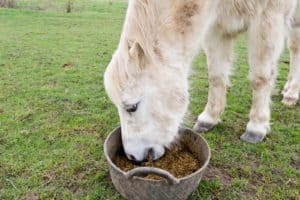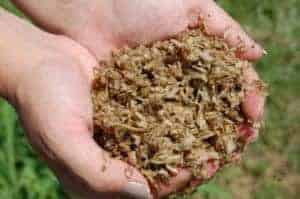
Putting the Brakes on Bolting
Does your horse devour his meals? Slowing your speedy eater down at mealtime can help prevent issues such as choke and wasted feed.

Does your horse devour his meals? Slowing your speedy eater down at mealtime can help prevent issues such as choke and wasted feed.

This inflammation of the lungs most commonly affects foals, but that doesn’t mean your mature horse isn’t at risk.

Nutritionist: Soaking beet pulp helps with hydration, but dry beet pulp is also typically safe to feed some horses.

Chokes are common equine emergencies with potentially serious consequences. Here’s what you need to know.

Blending at least 15% chaff with a horse’s feed can increase consumption times and reduce health risks such as colic and choke.

Do older horses that eat senior feeds have a higher risk of choke?

When riding your horse in the woods or the wilderness, things can go wrong–and usually when least expected. Here are some possible predicaments you might face while out on the trail.

Find out which horses are at the highest risk for feed-related choke and what you can do to reduce that risk.

Critical conditions such as colic, injuries, and dehydration can strike when you’re at a competition with your horse. Here’s how to handle them.

Learn about special characteristics of each part of the horse’s digestive tract and different medical conditions that can develop there.

Readers said maintaining weight, osteoarthritis, and other lameness were their top senior horse care concerns.

Wearing a grazing muzzle during feeding is a simple, effective intervention for horses prone to choke, scientists found.

Stricture occurs when a ring of tissue reduces the esophagus’ diameter, making it hard for a horse to ingest food.

Does your horse drool like a dog? Here are some reasons why, from the benign to the life threatening.

We’ve taken a few minutes to tally our most popular blog posts of 2012. Did your favorites make the list?

Buscopan has been accepted as effective treatment for simple choke in other countries for 40 years.
Stay on top of the most recent Horse Health news with
© 2022 Copyright Statement dolor sit amet, consetetur sadipscing User Terms, sed diam nonumy eirmod tempor invidunt ut labore et dolore magna aliquyam erat, sed diam voluptua. At vero eos et accusam et justo duo dolores et ea rebum. Stet clita kasd gubergren, no sea takimata sanctus est Lorem ipsum dolor sit amet.
"*" indicates required fields